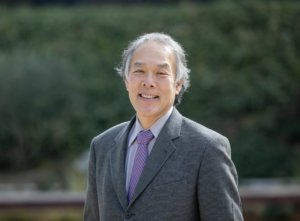Howard Hu was destined to make his mark at the intersection of health and humanity. He learned to love literature and the arts from his mother, who grew up in Europe and spoke seven languages as the daughter of a Chinese diplomat. He was taught an appreciation for science, and encouraged to pursue a career in medicine, by his father, an engineer.
In college, Hu studied biology and English, becoming familiar with both the physical body and the varied experiences of its inhabitant. After a stint writing short stories post-graduation, Hu enrolled in medical school, and began to consider different ways of thinking about health.
He spent a summer studying cancer risk among workers in an industrial dye plant and learned that their bladder cancer death rate was 17 times greater than those not working in the plant. This confirmed for Hu that health was much more than an individual issue. He earned his degree in public health between years two and three of medical school, concentrating in epidemiology.
Through his studies, and his admiration of civil and human rights advocates, Hu became fascinated with health on a population level. “I believe that the right to health is a human right,” Hu says, “and from that lens one can see a lot of the different issues that pertain to public health.”
Hu is grateful to his early-career mentors who saw the value in his passion for human rights. “At one point early in my career, while I was doing this as a fellow – I wasn’t faculty yet – the chairman of medicine turned to my mentor and said ‘What the heck is Howard Hu doing? Isn’t he supposed to be writing grants and publishing papers?’” Hu’s mentor not only protected his work but encouraged him to publish it.
“That’s part of what I try to mentor in my young scholars,” Hu says. “Your passion can be expressed definitely in science, even though there’s parts of it that are a little bit unconventional. And to the extent that you can make it part of what you’re able to communicate and part of your portfolio, all power to you. That’s part of harnessing the power of passion in our young scholars.”
Hu has also found scientific inspiration in those outside the scientific community. He recalls one study that found toxic waste dumps disproportionately placed in communities of color. He points out that this study was not convened by the public health community, but by the Church of Christ. While not affiliated with the church, Hu expressed admiration for their insight and tenacity. “We should have been thinking about this,” Hu says. “The inspiration for me is the people who are paying attention to the disparities that occur in our population and who will do something about it.”
Hu taps into his own passion as he conveys the interconnectedness of medicine, health, the environment and human rights. He stresses that in order to get a handle on our biggest health issues, society must integrate and coordinate efforts on many issues. “They’re interconnected, that is part of the challenge of population health sciences,” says Hu, citing hot-button topics ranging from COVID-19 co-morbidities, to addiction, to health insurance policies.
In addition to his own research, Hu has pursued academic leadership to progress his overarching goal of creating a meaningful impact in health and prevention. In the Department of Population and Public Health Sciences, he and a group of colleagues are shaping a number of new initiatives focusing on pandemic research and other topics affecting society. He is proud and excited to see how their efforts will be able to help.
“There are so many things that could be done with this broad view of better integrating public health with medicine,” Hu says, “I understood that you can’t do that unless you become a leader.”
